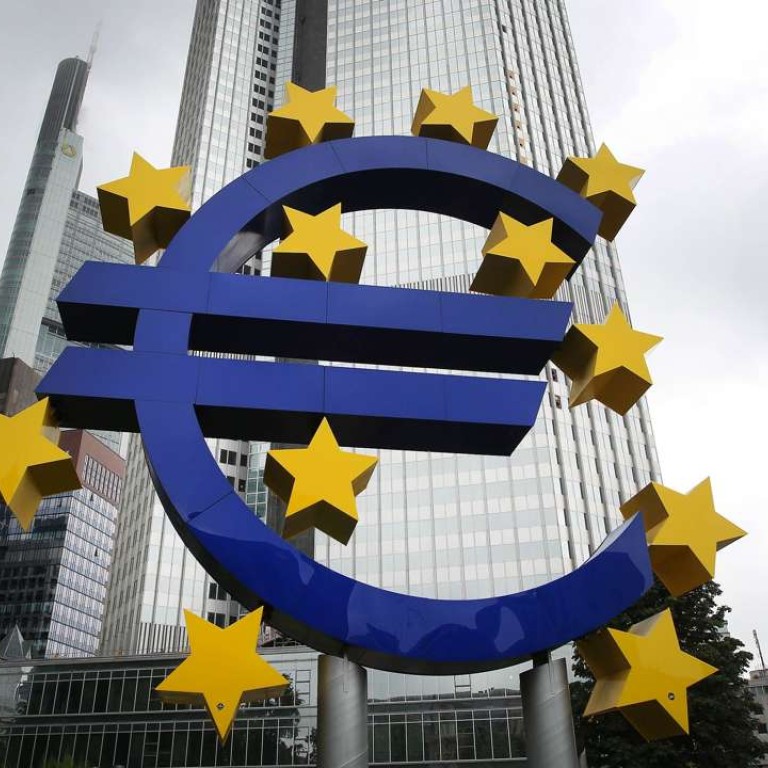
Germany risks losing the battle for stronger euro zone growth and survival
Europe’s powerhouse economy is not living up to expectations. Considering all the stimulus thrown Germany’s way by the European Central Bank in recent years, German growth underwhelms right now. Negative interest rates, a mass of printed QE money and an extremely competitive euro exchange rate seem to be doing far too little to jump-start the strong growth that euro zone policymakers desperately crave.
Germany’s export-reliant growth model is losing momentum, no surprise considering the slowdown in the global economy. And German consumers are not picking up the baton enough to carry growth to a higher level. Given extremely low levels of unemployment at 6 per cent and strong real wages, German consumers should loosen up, save less and spend more. Critically, Germany needs to spend more abroad, especially on imports from other euro zone nations.
German GDP only managed to expand by 0.4 per cent in the second quarter, down from a 0.7 per cent gain in the previous period. Business investment remains a weak link, with worries about Britain’s Brexit vote, structural weakness in many euro zone economies and the global slowdown all casting doubts about the future outlook. Export prospects are starting to wilt as well.
If German growth fails to show promise, it means the rest of the euro zone will be struggling as well
At the present rate of decay in consumer and business confidence, Germany will be hard pressed to meet consensus forecasts averaging around 1.6 per cent GDP growth over the next couple of years. If German growth fails to show promise, it means the rest of the euro zone will be struggling as well. And if there is a major shortfall in demand, Europe could be sliding towards another recession quite soon.
Europe needs a much stronger escape velocity to beat the grip of debt deflation, deleveraging and austerity following the 2008 global financial crisis. The ECB’s monetary super-stimulus has gone a long way to bridge a temporary gap, but now the euro zone needs to produce something much more concrete and far-reaching to secure long term recovery.
The ECB’s negative interest rates and eye-watering amounts of newly printed QE money are not only showing signs of weaker effect on the economy but are also causing some serious misallocation of resources. Despite an initial rush of euro zone lending growth after the introduction of the ECB’s QE programme, the demand for new loans is beginning to roll over. The banks may be flush with cash, but the take-up rate by borrowers is slackening off given the weak economic outlook.
Worse still, the ECB’s scatter-gun funding approach may be doing nothing more than pump-priming “irrational exuberance” in the financial markets, keeping equity, credit and bond prices over-inflated. This poses a real worry for investors down the road. Once the ECB’s 2 per cent CPI inflation target comes back into sight, without a solid rebound in growth expectations, financial markets could be left perilously exposed if the flow of new QE money is suddenly switched off.

Germany needs to be a lot more relaxed about balanced budget targets, setting aside the EU’s Fiscal Stability Pact until the euro zone returns to much stronger and sustainable growth. It would definitely help the weaker euro zone nations struggling to rein back deficits at the expense of faster economic activity. Germany must set an example and do more deficit spending of its own, especially on public investment and infrastructure projects.
Most important of all, Germany must embrace the goal of a common European budget, sharing the wealth of the richer nations for the benefit of the weaker economies. It will take strong leadership from Germany, but accepting true European Fiscal Union is a vital precondition for viable monetary union and a successful single currency ahead.
Sharing Germany’s prosperity across the board is a big political ask, but there will be much bigger dividends down the road in terms of faster European growth, stronger employment and a better sense of common wealth and identity.
Without a unified economic, fiscal and political purpose the euro remains at risk. Germany can play a much bigger role in helping the euro succeed.
David Brown is chief executive of New View Economics

